Waste collection
Iren Group operates in the waste collection sector in a number of different capacities, depending on the agreements in place with service providers:
- as operator, based on long-term service contracts, in 171 Municipalities in the provinces of Parma, Piacenza, Reggio Emilia (Iren Ambiente), La Spezia (Acam Ambiente), Vercelli (ASM Vercelli) and in the City of Turin (Amiat). In these contexts, the Group collaborates with the Regulatory Bodies to define targets and plan the collection systems;
- as a contractor, in the case of San Germano, with operational support to Public Administrations or other operators, in 129 other municipalities.
In 2021, the Group provided urban waste collection services in a catchment area of about 3 million residents, where the Group handled about 2.7 million tons of urban waste (approximately 358,000 tons collected by San Germano).
Also for 2021, in order to deal with the Covid-19 emergency, the Group organised the collection service by adopting specific methods, in line with the provisions of the Local Authorities: in Liguria, the dedicated collection of waste produced by families with cases of contagion or quarantine continued; in Piedmont and Emilia- Romagna, on the other hand, in the presence of cases of contagion or quarantine, the suspension of the sorting of waste was ordered, so as to send it for disposal through waste-to-energy, considered the most suitable way to guarantee health and safety. In addition, in the Emilia- Romagna region, the floor collection service continued in case of need.
Preventing waste generation, increasing sorted waste collection levels, and recycling waste are key objectives of management policies, as they reduce disposal requirements and thus the overall environmental impact. In addition to specific communication and information campaigns aimed at raising awareness among citizens to reduce waste production, Iren Group adopts advanced collection systems (door-to-door, ecological islands with user recognition, “pay-as-you-throw” system), which contribute to achieving excellent levels of sorted waste collection: in 2021, the Group reached 70.3% (69.3% in 2020), compared to a national average of 63%.
In the system offered to residents to increase the results of sorted waste collection, the presence of 317 waste collection centres (151 in the San Germano operation area) is particularly relevant, enabling residents to freely deposit different types of waste in large containers. The range of services is completed by collecting bulky waste at home and services dedicated to companies for the management of waste assimilated to urban waste.
Of the 1,370,384 tons of urban waste collected in the areas where the Group acts as operator, 960,162 tons referred to sorted waste. Positive results were also obtained in the municipalities served by San Germano with 244,969 tons of sorted urban waste collected (up 13% compared to 2020).

In 2021, the percentage of sorted waste collection has once again improved, reaching 81% in the areas of Parma and Reggio Emilia and also improving significantly in the City of Turin (52.9% compared to 50.7% in 2020).
In line with sector directives and local planning, in the 2030 Business Plan, the Group has confirmed its commitment to achieving further growth in sorted waste collection in order to reach 76.2% in the basin served by 2030, through the ongoing development of local and home collection services and “pay-as-youthrow” systems.
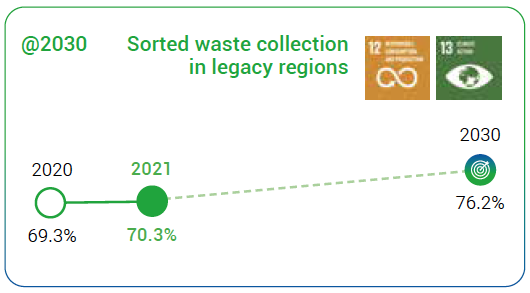
At the end of 2021, residents of legacy regions served by punctual metering systems are 26% of the total, up from 18% in 2020 and in line with the goal of 64% in the 2030 Business Plan.

For the development and increasingly efficient management of collection, we highlight the importance of the project of computerisation of processes (JustIren) launched in 2020 in Turin and gradually extended in 2021 in the other territories (Emilia, La Spezia and Vercelli). Once fully operational, JustIren will allow to obtain important environmental benefits, thanks to the optimisation of the collection services, of the logistics of waste delivery, of the monitoring of the services on the territory and of the extension of “pay-as-you-throw” system.
Sorted waste, up 4% compared to 2020, is sent to recovery through specialised platforms and sector supply chains, thanks to the agreements in place with the Consortia belonging to Conai (National Packaging Consortium), or through private operators.
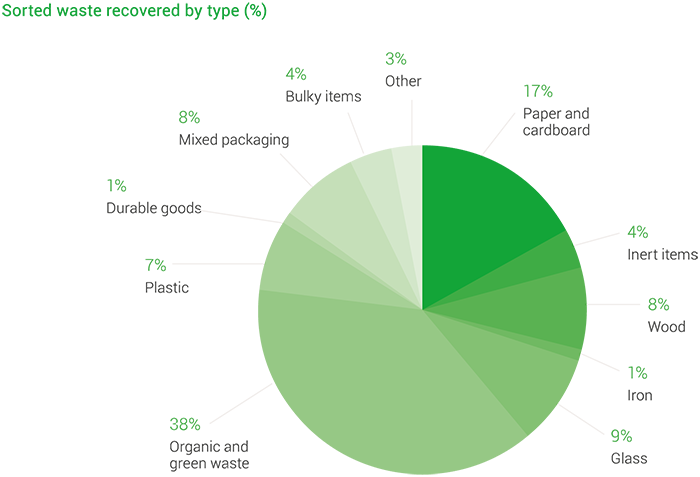
Waste recovery, treatment and disposal
In order to guarantee an effective management of the entire waste cycle, the Group is also committed to the treatment and disposal, the recovery of material and the valorisation of the resource waste for the generation of electricity, heat and biogas through a structured system of plants. In 2021, the Group’s plant base expanded, thanks to both the construction of new plants and newly acquired companies. In the fall of 2021, the new plastics recovery and Bluair® production plant in San Giorgio di Nogaro went into operation and, during the same period, work was awarded on the new wood recovery plant in Vercelli. As far as new acquisitions are concerned, the Group has added a plant for the recovery of sorted waste collection (A.M.A.) and a composting plant (Futura), as well as various other storage and transfer, liquid treatment, mechanical-biological treatment (TMB) plants.
The plants owned by Iren Group at 31/12/2021 are as follows:
| Plants | Number | |
|---|---|---|
| Waste-to-energy plants | 3 | |
| Operating landfills | 4 | |
| Storage and transfer | 22 | |
| Liquid waste treatment | 6 | |
| Material recovery | 15 | |
| Organic waste treatment and recovery | 4 | |
| Mechanical-biological treatment | 5 | |
As already highlighted above, in the Business Plan to 2030, the Group has demonstrated a significant commitment to closing the circular economy cycle, by foreseeing huge investments in numerous new plants for the recovery of the organic fraction, with the production of compost and biomethane, for the recovery of paper, plastic and wood, with the production of materials that are reintroduced on the market: the goal is to reach 2.3 million tons of material recovery capacity from waste in owned plants.
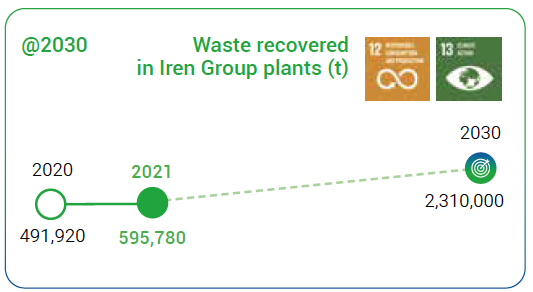
Biomethane production
The Cairo Montenotte and Santhià plants are two plants for the recovery of organic waste, which from 2021 will produce, in addition to quality compost, biomethane, a natural gas derived from the refining and purification of biogas produced during the anaerobic digestion of organic waste and the green fraction. This is the virtuous product of sustainable waste management, in this case deriving from the transformation of the organic fraction, which today constitutes about 40% of the total waste produced.
The process, defined as upgrading, allows to increase the percentage of methane contained in the biogas, up to about 99% within the mixture. In this way, the energy characteristics and uses of biomethane correspond to all effects to those of natural methane, with two substantial differences: it is not extracted from the bowels of the earth, eliminating the dangers of extraction and transport, and it is obtained from renewable raw materials that can be found near the production plant.
Biomethane is to all intents and purposes a renewable source of energy, an example of circular economy and an indispensable support for decarbonization, for example of the mobility sector, which contributes to reducing the use of fossil fuels, the main source of GHG emissions.
In its Business Plan, Iren Group has set, among the objectives linked to the circular economy, the production of around 57 million m3 of biomethane by 2030.
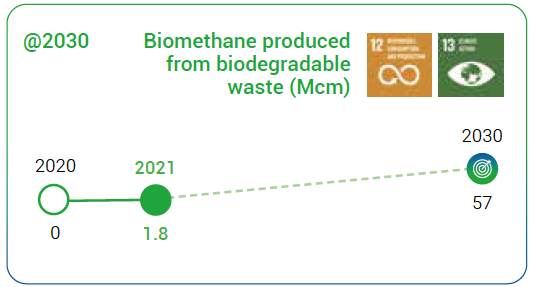
In 2021, a total of 3.6 million tons of waste was managed, including 385,744 tons collected by San Germano (these quantities are not included in the breakdowns below).

The sorted component of the waste is growing compared to 2020, thanks both to the increase in sorted waste collection in the legacy regions and to the new material recovery and composting plants. This fraction of the waste can be sent directly for recovery or transit through Group plants or storage areas, where it is sorted and/ or treated before its final destination.
The unsorted component of the waste is destined for various disposal methods searching for the best use of the waste resource that sees energy recovery, through waste-to-energy, as the most effective solution from an environmental point of view. The significant increase recorded in 2021 in the quantities of special and unsorted waste managed is due to the entry into the Group’s boundary of the companies of the former Unieco Environment Division which, as described above, carry out brokerage activities and manage various waste treatment plants, landfills and mechanical-biological treatment (TMB) plants. The latter type of plant allows for the mechanical selection of unsorted waste, intercepting the organic fraction present in it which, once biologically stabilised, can be sent for recovery. In 2021, approximately 275,000 tons of waste was processed at the Group’s owned TMBs.
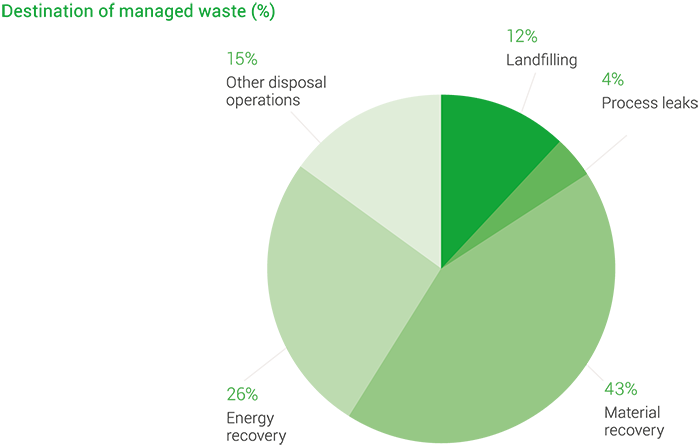
43% of the waste managed in 2021 was destined for the material recovery chain in Group and third-party plants. Waste sent to landfill represents approximately 12% of the total, up from 5% in 2020 due to the change in boundary.

1 The Group does not handle radioactive waste. Specific management and control procedures are in place at the plants, which require that any waste with a radioactive load intercepted prior to entering the plants (e.g. household/medical waste) is inspected by qualified experts, stored in special quarantine areas and sent for disposal only when the radioactive load has decayed.
47% of the portion of waste that could not be recovered as a material was sent to energy recovery and the remaining part to other disposal operations or to landfills
Also in 2021, no waste was sent for incineration without energy recovery. Compared to the total waste managed by the Group in 2021, only 3% is of hazardous type1 (about 14,300 tons sent to material recovery and about 89,000 tons to disposal).